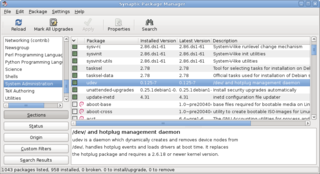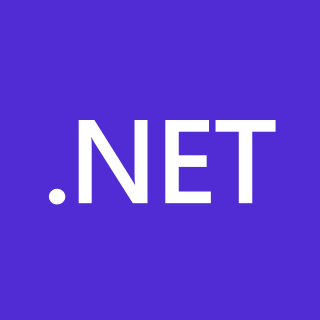Related Research Articles

GNU is an extensive collection of free software, which can be used as an operating system or can be used in parts with other operating systems. The use of the completed GNU tools led to the family of operating systems popularly known as Linux. Most of GNU is licensed under the GNU Project's own General Public License (GPL).

A Linux distribution is an operating system made from a software collection that includes the Linux kernel and often a package management system. Linux users usually obtain their operating system by downloading one of the Linux distributions, which are available for a wide variety of systems ranging from embedded devices and personal computers to powerful supercomputers.
Microsoft Windows is a product line of proprietary graphical operating systems developed and marketed by Microsoft. It is grouped into families and sub-families that cater to particular sectors of the computing industry -- Windows (unqualified) for a consumer or corporate workstation, Windows Server for a server and Windows IoT for an embedded system. Defunct families include Windows 9x, Windows Mobile, Windows Phone, and Windows Embedded Compact.

Wine is a free and open-source compatibility layer to allow application software and computer games developed for Microsoft Windows to run on Unix-like operating systems. Developers can compile Windows applications against WineLib to help port them to Unix-like systems. Wine is predominantly written using black-box testing reverse-engineering, to avoid copyright issues. No code emulation or virtualization occurs. Wine is primarily developed for Linux and macOS.

A package manager or package-management system is a collection of software tools that automates the process of installing, upgrading, configuring, and removing computer programs for a computer in a consistent manner.
In computing, cross-platform software is computer software that is designed to work in several computing platforms. Some cross-platform software requires a separate build for each platform, but some can be directly run on any platform without special preparation, being written in an interpreted language or compiled to portable bytecode for which the interpreters or run-time packages are common or standard components of all supported platforms.
Linux adoption is the adoption of Linux computer operating systems (OS) by households, nonprofit organizations, businesses, and governments.

Linux is a family of open-source Unix-like operating systems based on the Linux kernel, an operating system kernel first released on September 17, 1991, by Linus Torvalds. Linux is typically packaged as a Linux distribution (distro), which includes the kernel and supporting system software and libraries, many of which are provided by the GNU Project. Many Linux distributions use the word "Linux" in their name, but the Free Software Foundation uses and recommends the name "GNU/Linux" to emphasize the use and importance of GNU software in many distributions, causing some controversy.
A desktop environment is a collection of software designed to give functionality and a certain look and feel to an operating system.

In the 1950s and 1960s, computer operating software and compilers were delivered as a part of hardware purchases without separate fees. At the time, source code, the human-readable form of software, was generally distributed with the software providing the ability to fix bugs or add new functions. Universities were early adopters of computing technology. Many of the modifications developed by universities were openly shared, in keeping with the academic principles of sharing knowledge, and organizations sprung up to facilitate sharing. As large-scale operating systems matured, fewer organizations allowed modifications to the operating software, and eventually such operating systems were closed to modification. However, utilities and other added-function applications are still shared and new organizations have been formed to promote the sharing of software.

Kiwix is a free and open-source offline web browser created by Emmanuel Engelhart and Renaud Gaudin in 2007. It was first launched to allow offline access to Wikipedia, but has since expanded to include other projects from the Wikimedia Foundation, public domain texts from Project Gutenberg, many of the Stack Exchange sites, and many other resources. Available in more than 100 languages, Kiwix has been included in several high-profile projects, from smuggling operations in North Korea to Google Impact Challenge's recipient Bibliothèques Sans Frontières.
Besides the Linux distributions designed for general-purpose use on desktops and servers, distributions may be specialized for different purposes including computer architecture support, embedded systems, stability, security, localization to a specific region or language, targeting of specific user groups, support for real-time applications, or commitment to a given desktop environment. Furthermore, some distributions deliberately include only free software. As of 2015, over four hundred Linux distributions are actively developed, with about a dozen distributions being most popular for general-purpose use.

The .NET platform is a free and open-source, managed computer software framework for Windows, Linux, and macOS operating systems. The project is mainly developed by Microsoft employees by way of the .NET Foundation and is released under an MIT License.

FBReader is an e-book reader for Linux, Microsoft Windows, Android, and other platforms.
Microsoft, a technology company historically known for its opposition to the open source software paradigm, turned to embrace the approach in the 2010s. From the 1970s through 2000s under CEOs Bill Gates and Steve Ballmer, Microsoft viewed the community creation and sharing of communal code, later to be known as free and open source software, as a threat to its business, and both executives spoke negatively against it. In the 2010s, as the industry turned towards cloud, embedded, and mobile computing—technologies powered by open source advances—CEO Satya Nadella led Microsoft towards open source adoption although Microsoft's traditional Windows business continued to grow throughout this period generating revenues of 26.8 billion in the third quarter of 2018, while Microsoft's Azure cloud revenues nearly doubled.
vcpkg is a cross-platform open source package manager by Microsoft.

Azure Linux, previously known as CBL-Mariner, is a free and open-source Linux distribution that Microsoft has developed. It is the base container OS for Microsoft Azure services and the graphical component of WSL 2.
Comparison of user features of operating systems refers to a comparison of the general user features of major operating systems in a narrative format. It does not encompass a full exhaustive comparison or description of all technical details of all operating systems. It is a comparison of basic roles and the most prominent features. It also includes the most important features of the operating system's origins, historical development, and role.
References
- ↑ Yu-wei, Lin (June 2005), "Epistemologically Multiple Actor-Centred System: or EMACS at Work!" (PDF), System Design Frontier, vol. 2, no. 6, pp. 25–35, retrieved April 21, 2013.
- ↑ Beebe, Nelson H. F. (2003), "25 Years of TEX and METAFONT: Looking Back and Looking Forward" (PDF), TUGboat, vol. 25, no. 1, pp. 7–30, archived from the original (PDF) on March 4, 2016, retrieved April 21, 2013.
- ↑ Richard Stallman. "new Unix implementation".
- ↑ "Desktop Browser Market Share Worldwide". statcounter.com.
- ↑ Hachman, Mark (October 5, 2010). "Nielsen: Android Is Most Popular Smartphone OS | News & Opinion". PCMag.com. Retrieved August 12, 2013.
- ↑ Ravi Mandalia (July 20, 2011). "Microsoft Survey Reveals GitHub, Git Most Popular among Developers". IT Pro Portal. Retrieved September 28, 2013.
- ↑ Devin Coldewey (September 27, 2013). "Android overtakes iPad in tablet race". NBC News. Retrieved September 28, 2013.
- ↑ "Debian 10: Playing catch-up with the rest of the Linux world (that's a good thing)". Ars Technica. September 11, 2019. Retrieved September 1, 2020.
- ↑ Moore, Mike. "Microsoft may finally have some encouraging news for Windows 10 users". TechRadar. Retrieved September 1, 2020.
- ↑ Popa, Bogdan. "Windows Grows as Linux Declines a Little in July 2020". softpedia. Retrieved September 1, 2020.